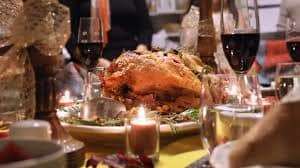
As the holidays descend upon us, risks for your companion animals increase and can reduce the season merriment.
While you may get busy making holiday arrangements and planning parties, it is important to try to keep your pet’s eating and exercise habits as close to their normal routine as possible. Keeping your pets away from toxic treats is also essential as well as dangerous decorations.
Be Careful with Seasonal Plants and Decorations

Things to watch out for:
- Christmas Tree: Securely anchor your Christmas tree so it doesn’t tip and fall, causing possible injury to your pet. This will also prevent the tree water—which may contain fertilizers that can cause stomach upset—from spilling. Stagnant tree water is a breeding ground for bacteria, and your pet could end up with nausea or diarrhea should he imbibe.
- Avoid Mistletoe & Holly: Holly, when ingested, can cause pets to suffer nausea, vomiting and diarrhea. Mistletoe can cause gastrointestinal upset and cardiovascular problems. And many varieties of lilies can cause kidney failure in cats if ingested. Opt for artificial plants made from silk or plastic, or choose a pet-safe bouquet. The SPCA has a list of which plants/flowers to avoid.
- Menorah fires: Make sure lit menorah candles are out of the way and in an area your cat or dog can’t get close to or singe themselves on.

- Tinsel-less Town: Kitties love this sparkly, light-catching “toy” that’s easy to bat around and carry in their mouths. But a nibble can lead to a swallow, which can lead to an obstructed digestive tract, severe vomiting, dehydration and possible surgery. It’s best to brighten your boughs with something other than tinsel.
- Wires Up: Keep wires, batteries and glass or plastic ornaments out of paws’ reach. A wire can deliver a potentially lethal electrical shock and a punctured battery can cause burns to the mouth and esophagus, while shards of breakable ornaments can damage your pet’s mouth and digestive tract.
Avoid Holiday Food Dangers

Skip the Sweets: Most owners know that chocolate is bad for pets. But the artificial sweetener xylitol can also cause severe side effects. Pets may go to extraordinary lengths to put tasty things in their mouths and swallow. In addition, fatty foods (or regular people food) can cause intestinal upset as well as pancreatic inflammation, called pancreatitis.
Keep pets away from your table. Fatty, spicy and no-no human foods, as well as bones, should not be fed to your furry friends. Pets can join the festivities in other fun ways that won’t lead to costly medical bills.
Leave the Leftovers: Fatty, spicy and no-no human foods, as well as bones, should not be fed to your furry friends. Pets can join the festivities in other fun ways that won’t lead to costly medical bills.
Careful with Cocktails: If your celebration includes adult holiday beverages, make sure unattended alcoholic drinks are placed where pets cannot get to them. If ingested, your pet could become weak, ill and may even go into a coma, possibly resulting in death from respiratory failure. Emergency treatment is needed!
Pet-friendly stocking stuffers: Looking to stuff your pet’s stockings? Stick with chew toys that are basically indestructible, Kongs that can be stuffed with healthy foods or chew treats that are designed to be safely digestible. Long, stringy things are a feline’s dream, but the most risky toys for cats involve ribbon, yarn and loose little parts that can get stuck in the intestines, often necessitating surgery. Surprise kitty with a new ball that’s too big to swallow, a stuffed catnip toy or the interactive cat dancer.
Lilies: A common pretty flower found in many holiday arrangements. This flower is highly toxic to cats and can cause life-threatening kidney failure if ingested
Plan a Pet-Safe Holiday Gathering
- House Rules: If your animal-loving guests would like to give your pets a little extra attention and exercise while you’re busy tending to the party, ask them to feel free to start a nice play or petting session.
- Put the Meds Away: Make sure all of your medications are locked behind secure doors, and be sure to tell your guests to keep their meds zipped up and packed away, too.
- A Room of Their Own: Give your pet their own quiet space to retreat to—complete with fresh water and a place to snuggle. Shy pups and cats might want to hide out under a piece of furniture, in their carrying case or in a separate room away from the hubbub.
- New Year’s Noise: As you count down to the new year, please keep in mind that strings of thrown confetti can get lodged in a cat’s intestines, if ingested, perhaps necessitating surgery. Noisy poppers can terrify pets and cause possible damage to sensitive ears. And remember that many pets are also scared of fireworks, so be sure to secure them in a safe, escape-proof area as midnight approaches.
Always Be Prepared !!!!

Your animal may become poisoned in spite of your best efforts to prevent it. You should keep telephone numbers for your veterinarian, a local emergency veterinary service, and the ASPCA Animal Poison Control Center 1-888-4ANI-HELP (1-888-426-4435, for a fee) in a convenient location. If you suspect that your pet has ingested something poisonous, seek medical attention immediately.
ASPCA Animal Poison Control Center
1-888-4ANI-HELP (for a fee)
1-888-426-4435
www.apcc.aspca.org
ASPCA Animal Poison Control Center
The ASPCA Animal Poison Control Center, an operating division of the American Society for the Prevention of Cruelty to Animals (ASPCA) is a unique, emergency hotline providing 24-hour-a-day, 7-day-a-week telephone assistance to veterinarians and pet owners.
The Center’s hotline veterinarians can quickly answer questions about toxic substances found in our everyday surroundings that can be dangerous to animals.
Veterinary professionals provide around-the-clock, on-site coverage of the Center. The phone number of the Center is 1-888-4ANI-HELP (1-888-426-4435) and the website is www.apcc.aspca.org.


